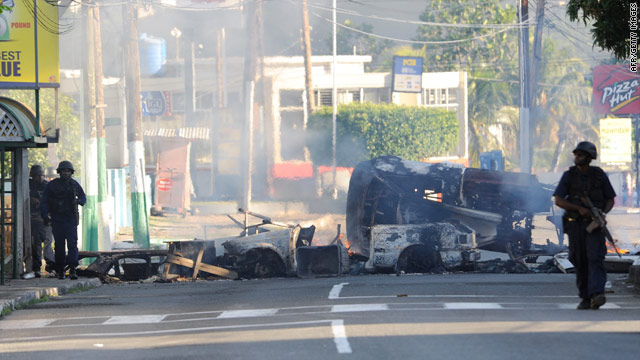 Kingston, Jamaica (CNN) -- Tensions rippled through Jamaica's capital on Tuesday, with security forces squaring off against some residents who want to prevent the extradition of an alleged drug dealer to the United States.
Kingston, Jamaica (CNN) -- Tensions rippled through Jamaica's capital on Tuesday, with security forces squaring off against some residents who want to prevent the extradition of an alleged drug dealer to the United States.Jamaican Prime Minister Bruce Golding has declared a state of emergency in some parts of Kingston. Schools are closed in the capital, and the United States shut its embassy Tuesday, with only essential staff reporting to work.
The unrest revolves around U.S. attempts to extradite suspected drug kingpin Christopher "Dudus" Coke, who was charged last year in federal court with conspiracy to distribute marijuana and cocaine and with conspiracy to traffic in firearms illegally.
Coke maintains a heroic reputation in the Kingston slums, with some people comparing him to Robin Hood, Jesus and one-time Colombian kingpin Pablo Escobar. He has helped the community by handing out food, sending children to school and building medical centers.
Experts: Accused Jamaican drug lord akin to Robin Hood
But drug enforcement officials said he deserves to be classified as one of the world's most dangerous drug lords.
Video: U.S.: Violence won't stop extradition
"He is the head of an organization, a cartel or a syndicate that has a global impact and also has a direct impact on the United States," said Michael Braun, a former chief of operations for the U.S. Drug Enforcement Administration.
Violence erupted Monday, with police saying a number of people had died in an attack on the suspect's stronghold in West Kingston. But authorities would not divulge how many fatalities occurred.
Residents said that government helicopters dropped explosives into the area near Coke's stronghold, though it was not clear if he was there.
Are you there? Send stories and images to iReport
Earlier Monday, residents had blocked roads in the area to restrict access to police and military. The violence then spread to Spanish Town, about 20 minutes outside the capital, where armed thugs blocked a major road and a bridge that serves as a link between Montego Bay and Kingston, police said.
Looting also occurred in downtown Kingston.
Monday's unrest came the day after two police officers were killed and six others were wounded in shooting late Sunday near Norman Manley International Airport outside Kingston, police said.
The airport's main entrance remained open, and flights were arriving and departing on schedule, said Paul Hall, senior vice president for operations at the Airports Authority of Jamaica.
Coke's attorneys were to meet with the charge d'affaires officer at the U.S. Embassy in Kingston.
One of those attorneys, Don Foote, said he would listen to U.S. authorities but insisted his client should face any charges in Jamaican courts.
Last week, Golding said citizens should "allow the courts to deal with the extradition matter," the state-run Jamaica Information Service reported.
In a statement Sunday, Golding announced an emergency meeting of his Cabinet in response to the heavy gunfire and blockades, the information agency said.
In Washington, U.S. State Department spokesman P.J. Crowley said Monday that officials were watching the "deteriorating situation" carefully.
"We continue to work with the government of Jamaica collaboratively to counter illicit trafficking," he said.
Larry Birns, director of the Center for Hemispheric Affairs think tank, said he believes Jamaica "is probably tipping into being a narco-state and it has become too big a problem for the United States to handle in the tried and true ways of the past."
In August, the U.S. attorney's office in New York charged Coke, accusing him of leading an international criminal syndicate known as the "Shower Posse."
"At Coke's direction and under his protection, members of his criminal organization sell marijuana and crack cocaine in the New York area and elsewhere, and send the narcotics proceeds back to Coke and his co-conspirators," the DEA said.
"Coke and his co-conspirators also arm their organization with illegally trafficked firearms," the agency said.
Coke is on the Justice Department's list of Consolidated Priority Organization Targets, which the department said "includes the world's most dangerous narcotics kingpins."



